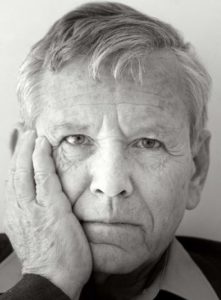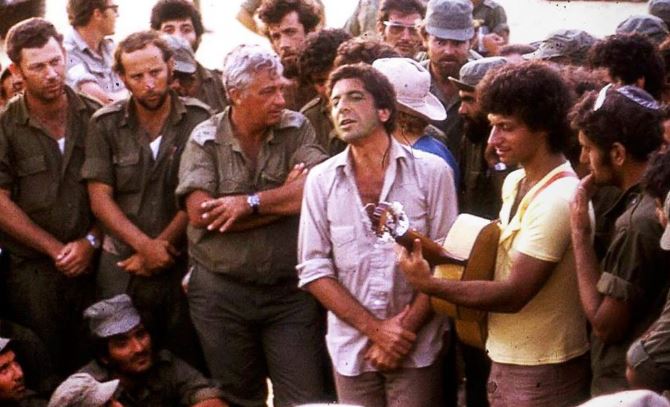Israel’s Greatest Writer

Amos Oz (Credit: Michiel Hendryckx)
Amos Klausner (1939-2018) was born in Jerusalem, the only child of Lithuanian- and Polish-Jewish parents. Although his family was entirely secular, Amos was sent to a religious school because the only other option was a socialist school that his parents vehemently opposed. At 14, he decided to go off on his own, changed his last name to “Oz”, and joined a kibbutz. He wasn’t fit for kibbutz work, and was made fun of constantly. Oz found solace in writing, and was eventually given permission by the kibbutz to have one day off a week to do so. After three years of military service, the kibbutz sent him to study literature and philosophy at the Hebrew University. He graduated in 1963, returning to the kibbutz to work as a teacher, and continuing to write once a week. Two years later, he published his first book, a collection of short stories. It was his third publication, the novel My Michael, that became a bestseller and thrust him into fame. (Even after this, his kibbutz only allowed three days a week to write!) Oz would follow that up with 13 more popular novels, four more collections of prized short stories, and another twelve of essays on various topics, along with two children’s books. The most famous of these is his 2002 memoir, A Tale of Love and Darkness, which was adapted into a film by Natalie Portman. All in all, he produced some 40 books and 450 essays, with his work translated into nearly 50 languages – more than any other Israeli writer. Oz served in both the Six-Day War and the Yom Kippur War. In 1987, he came a professor of Hebrew literature at Ben-Gurion University, a post he held until 2014. While often seen as the face of the Israeli left, Oz defended Israel in its military campaigns, explaining their necessity and never failing to point out the evils of the terrorist enemy. He was one of the first to speak of a two-state solution (penning an essay immediately after the Six-Day War) and was opposed to Israeli settlements, but supported the West Bank barrier wall. He admitted that Israelis have always been willing to work for peace while Arabs not so much, and said that it takes “two hands to clap”. He remained a staunch Zionist his entire life and vocally opposed non-Zionists. In these ways, he mitigated the Israeli left, trying to keep them from falling into extremes, and from getting into the habit of blaming Israel for everything. Oz worked tirelessly for peace, and some of his actions in doing so were severely criticized (like the recent letter he sent to imprisoned Palestinian activist/terrorist Marwan Barghouti). Among his long list of awards is the Israel Prize, the French Legion of Honour, the Spanish Order of Civil Merit, and the South Korean Park Kyong-ni Prize for Literature. Sadly, Oz passed away last week. The man who has been called Israel’s greatest writer was laid to rest in the kibbutz that was his home for over three decades.
Words of the Week
The story of modern Israel, as many have noted, is a miracle unlike any… It is a robust and inclusive democracy, and is at the leading edge of science and technology… What hypocrites demand of Israelis and the scrutiny Israel is subjected to by them, they would not dare make of any other nation.
– Salim Mansur

 Moshe Berkowitz (b. 1954) was born in Kfar Saba, Israel. At the young age of 11, he joined the Maccabi Tel Aviv basketball youth club. Within a few years, he made the junior team, and at just 17 years old, was already playing on the senior team in the Israeli Basketball Premier League. The same year, he took the Israeli under-18 team to the FIBA (International Basketball Federation) European Championship finals, and was the overall leading scorer of the whole tournament. Shortly after, he led the national team to a gold medal in the 1974 Asian Games in Tehran. This came at a time when Israel was still reeling from the devastating Yom Kippur War, and Berkowitz became a symbol of Israeli strength, success, and vitality. He has since been credited with playing a key role in re-inspiring Israeli youth in the wake of the war.
Moshe Berkowitz (b. 1954) was born in Kfar Saba, Israel. At the young age of 11, he joined the Maccabi Tel Aviv basketball youth club. Within a few years, he made the junior team, and at just 17 years old, was already playing on the senior team in the Israeli Basketball Premier League. The same year, he took the Israeli under-18 team to the FIBA (International Basketball Federation) European Championship finals, and was the overall leading scorer of the whole tournament. Shortly after, he led the national team to a gold medal in the 1974 Asian Games in Tehran. This came at a time when Israel was still reeling from the devastating Yom Kippur War, and Berkowitz became a symbol of Israeli strength, success, and vitality. He has since been credited with playing a key role in re-inspiring Israeli youth in the wake of the war.

